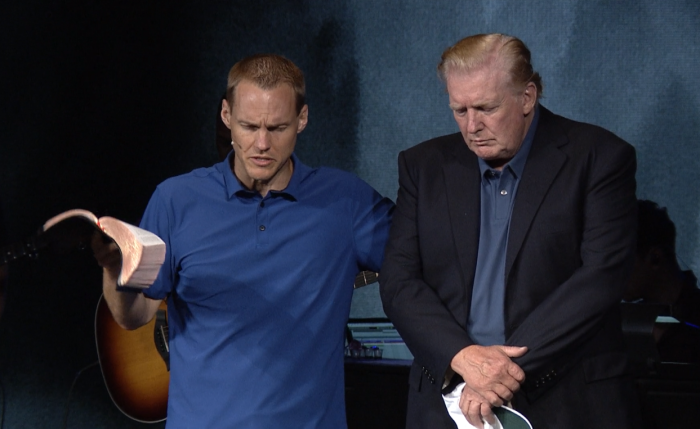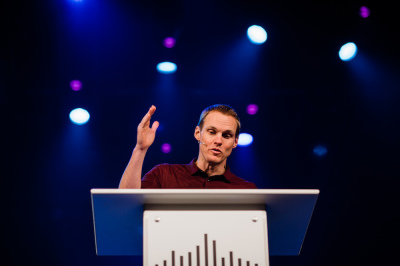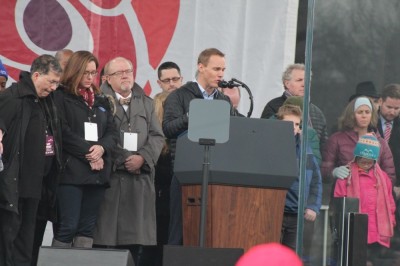David Platt on how Christians should approach election: 'I don’t want to see the church further divided'

Author and megachurch pastor David Platt garnered national headlines back in June 2019 when he prayed over President Donald Trump on the main stage of McLean Bible Church.
The prayer, which came after Trump made an unexpected visit to the D.C.-area congregation, elicited strong reactions from people on social media, as well as within McLean itself.
The fallout from the decision to pray over the polarizing Trump inspired Platt to write and release a new book, titled Before You Vote: Seven Questions Every Christian Should Ask.
Released last month, Platt wrote in the introduction of the book that he felt “compelled to write this short book as we approach a presidential election in our country.”
“I don’t want to see the church further divided or the name of Christ further defamed. Instead, I long to see a united church that exalts the name of Christ in this toxic political climate,” he explained.
“My hope is to fuel deeper affection for Christ while fostering healthier conversations among Christians as we participate in a presidential election.”
Among the seven questions Platt poses in the book are “Does God call me to vote?” “Who has my heart?” “What does my neighbor need?” and “How do I weigh the issues?”
“In the end, what’s most important, and what I am definitively advocating for based on God’s Word, is the realization that how we use our vote is a matter of faithfulness before God,” Platt wrote.
“For our vote is a unique privilege and responsibility that God has entrusted to us by his grace, and God calls us to use every means of grace he grants us to love him above all and love our neighbors as ourselves.”
The Christian Post interviewed Platt via email on Wednesday. Excerpts from his response are below.
CP: In the book, you warned that "if we are not careful, we can subtly begin to promote and defend whatever a candidate or party does." How pervasive a problem do you believe this is in the American church and do you believe it has gotten worse in recent years?

Platt: Because no political party or candidate has a monopoly on that which is good and right, and every political party and candidate demonstrates evidence of fallenness, I believe it is unhealthy for the church to align with a political party or candidate. And I see evidence of this on both sides of the aisle in the church in America.
If we’re not careful, we can easily find ourselves blindly supporting or habitually siding with certain candidates or parties without biblically assessing what they are saying or standing for. And we can be hesitant to hold a candidate or party accountable when what they’re saying or doing doesn’t align with Scripture.
The church is not for Trump, and the church is not for Biden. The church is for Jesus, because He alone is worthy of our trust, allegiance, and hope, and His glory alone is always our aim, not the promotion of a political candidate or party.
CP: In chapter three, you told readers "don’t sell your soul to a political party whose campaign slogans center on you." Do you believe that either the Democratic or Republican Parties are guilty of this?
Platt: By nature, political campaigns are designed to appeal to voters’ personal preferences. Both parties entice potential voters with how they will protect our rights, promote opportunities for us, and afford us a better life. In this way, the rhetoric coming from both sides of the aisle can subtly but significantly contradict the call of Jesus, who beckons us to die to ourselves, lay down our rights, and love our neighbors as we love ourselves.
CP: In chapter four, you warned against labeling things like "racism or immigration or poverty relief" with the term "Gospel Issues." In recent times, some conservative Christian theologians and groups have warned against the growing presence of critical race theory and social justice ideas in churches. What is your opinion of these apparent trends that some find heretical?
Platt: I want to be clear that issues like racism, immigration, and poverty relief certainly relate to the gospel. The gospel makes clear that God has made all people equally in his image, so racism is wrong. And the fruit of our salvation by God’s grace in the gospel includes care for the immigrant and the poor in our lives.
The problem is when we call these “gospel issues” in such a way that we imply specific policies that are not spelled out in Scripture must be embraced by everyone who believes the gospel. Or when we equate an issue like poverty relief with the essence of the gospel, turning the gospel into a message of social action instead of a message of divine salvation.
So we absolutely want to take political positions and make political calculations that are informed by gospel foundations. We just need to be careful to refrain from using language that unnecessarily, unhelpfully, or unbiblically ties the gospel to a political position or calculation.
Our foundation is never secular theories (including, but not limited to, critical race theory) or ideas (including worldly ideas about social justice). Instead, we filter everything in this world through the lens of God’s Word (which has much to say, by the way, about justice and the dignity of all people made in God’s image), we zealously guard the centrality, supremacy, and integrity of the gospel that alone has power to save and transform people’s lives, and by His grace in the power of His Spirit we work to obey God’s Word and proclaim the gospel in all that we do.
CP: On the issue of abortion, you explained in the book that many Christians who find abortion wrong will still vote for a pro-choice politician because of other issues, like how they believe poverty or immigration reform should be addressed. Do you, as an individual, vote for or against a candidate chiefly over their stance on abortion?

Platt: Abortion defies God’s sovereign authority as Creator by putting to death a life made in His image. And in light of the prevalence of abortion (and laws permitting or even promoting abortion) in the United States as well as other countries around the world, abortion is a modern holocaust that poses a clear and present danger to millions of lives every single year.
I weigh this issue heavily when I am making political calculations. And more than merely in my political calculations, I want to live my life and lead my family and church to care for children in the womb as well as the moms who carry them, and to do all we can to serve moms, dads, and their children through pregnancy care, foster care, adoption, and other means.
CP: Staying on the issue of abortion and politics, as you may know, the occasional Catholic clergyman has garnered attention arguing that pro-choice Catholic politicians like Joe Biden and Nancy Pelosi should be denied Communion. Do you believe that churches with pro-choice politicians as members should in some way discipline them for their public policy stances on abortion?
Platt: According to Matthew 18:15-20 and 1 Corinthians 5, biblical accountability and discipline are necessary in the church whenever a member of the church is engaged in unrepentant sin and refuses to follow Jesus and that which is clear in His Word. Jesus outlines a process in which members of the church help one another turn from sin in these ways.
Without question according to God’s Word, abortion is sin, so the church has a responsibility to call members to turn from abortion. For this reason, if a politician in our church (or any member in our church, for that matter) was saying that abortion is not sin and they were living or leading accordingly, we would walk through the process Jesus outlined in Matthew 18:15-20, calling them to turn from beliefs and actions that go clearly against God’s Word.
I want to make clear that when we turn from any sin, including abortion, God forgives and heals and restores by His grace. Even that is the goal of accountability and discipline in the church—restoration to Christ—and I am so thankful for many people I know who have repented of abortion and experienced God’s gracious restoration in powerful ways.
CP: Regarding unity in the church, you mentioned that congregations should have more political diversity. What do you believe are the benefits of worshiping with people who may disagree with you politically?
Platt: Our unity is around Jesus and His Word. Therefore, I believe it is a sign of health in this fallen world to have deep relationships in the church with followers of Jesus whose political calculations and convictions may differ from our own (assuming those political calculations and convictions have biblical foundations).
Otherwise, we run the risk of deceiving ourselves into thinking that we have unity with other Christians around the gospel and God’s Word when, in reality, our unity is around a political ideology with Jesus on the side. This is why, in this book, I dive into Romans 14-15 to show how God instructs the church to operate when Christians disagree with one another in a fallen world.
When Jesus prayed for the unity of the church in John 17, He prayed that we might be one even as He and the Father are one “so that the world may know that you sent me.” That’s one of the main reasons I wrote this book. Because in a world where Christians are prone to divide into different churches over political candidates, parties, and positions, I believe we have a unique opportunity to show that there’s another way. To show that the church of Jesus Christ is a distinct and other-worldly community that transcends political parties and candidates.
CP: Many churches this election season are involved in efforts to revive civility. One is the “Golden Rule 2020" prayer campaign. What specific events or actions is McLean Bible Church taking to help advance political civility?
Platt: As a congregation in metro Washington, D.C., with over 100 different countries and many more perspectives than that represented in our church, we encourage one another to hold fast to that which is clear in God’s Word as we think about political issues and participate in the political process.
At the same time, on issues that are less clear in God’s Word, on which we may have disagreements and differences in the political arena, we encourage one another to share those differences with each other with humility, honesty, affection, sympathy, patience, kindness, gentleness, tenderness, and selflessness, through speech that is gracious, fair, encouraging, edifying, never slanderous, and always seasoned with salt, bearing with one another in love, assuming the best in one another by God’s grace, and caring for one another with the attitude of Christ.
My hope even in writing this book is to bring these biblical admonitions to the forefront in a toxic political climate in which we are continually tempted to accuse, belittle, cancel, distrust, disparage, deride, and divide from one another. Amidst toxic political waters that are poisoning the unity Jesus desires for His church and polluting the glory Jesus deserves through us in the world, we must be eager to maintain the unity of the Spirit in the bond of peace around Jesus and His Word for His glory in the world.




























